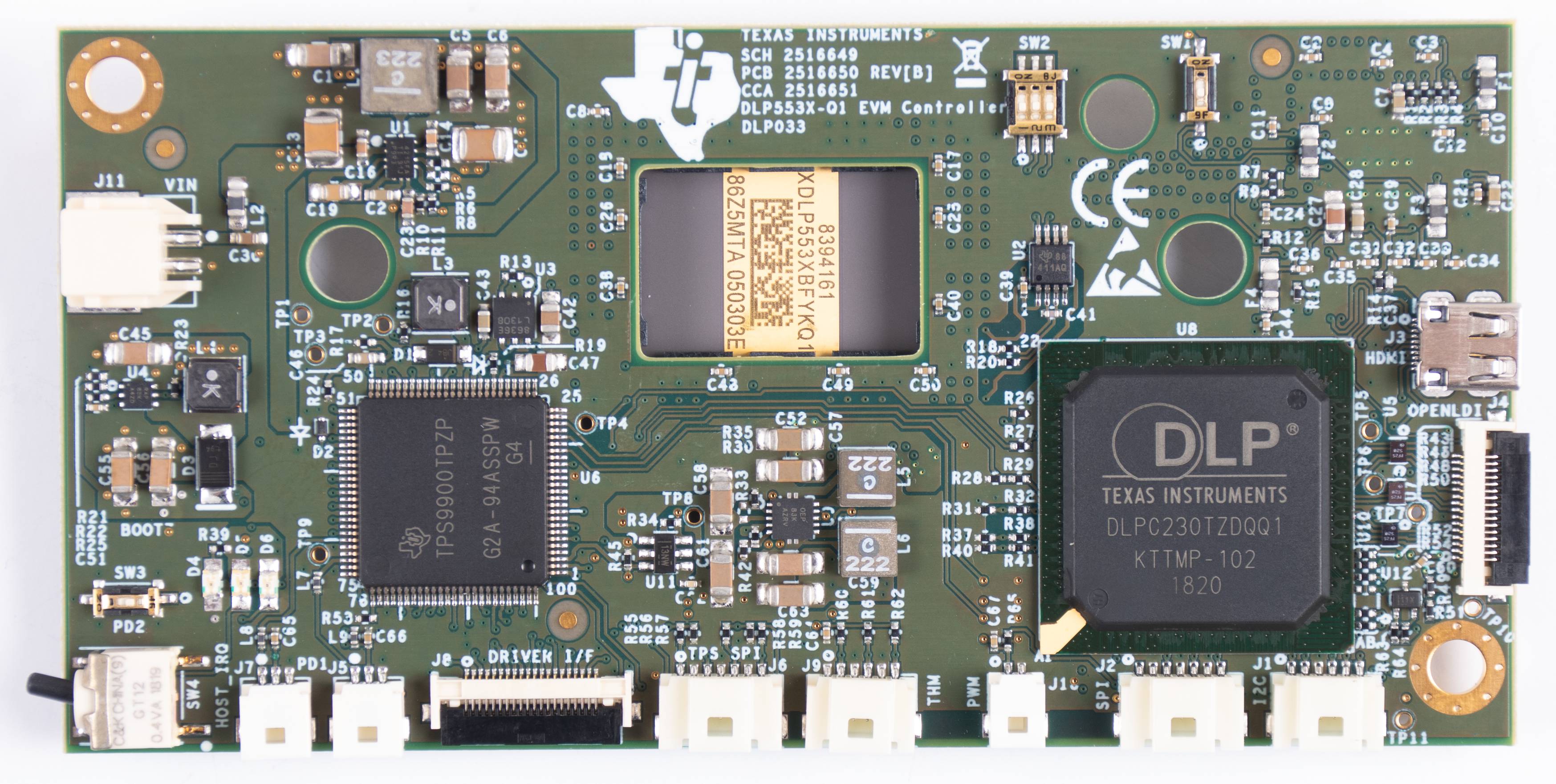DLPU107 May 2022 DLP5532-Q1
1.1.1 Controller PCB
The controller PCB shown in Figure 1-1 includes the DLP5532-Q1 DMD, the DLPC230-Q1 DMD Controller, and the TPS99000-Q1. The controller PCB supports video inputs from either a micro HDMI or OpenLDI interface and provides the formatting and control to display the video on the DLP5532-Q1 DMD. The EVM can be controlled with either a SPI or an I2C interface. The SPI or I2C interface can also be used to reprogram the serial Flash that is used to store DLPC230-Q1 software and configuration. An optional second SPI port is provided for monitoring the TPS99000-Q1. The EVM has an external photodiode input that is used to control white point and brightness over the dimming range. An optional second photodiode input is also provided. The EVM includes a flex interface to control and monitor the illumination driver PCB. It also provides an optional interface for thermistors on the red, green and blue illuminator PCBs that can be used to monitor the temperatures of the illuminators.
 Figure 1-1 DLP5532PROJHBQ1EVM Controller PCB
Figure 1-1 DLP5532PROJHBQ1EVM Controller PCBThe controller PCB contains the ports listed in Table 1-1. Indicator LEDs are listed in Table 1-2.
| Schematic Reference | Function |
|---|---|
| J1 | Host I2C, PROJ_ON, HOLD_BOOT, HOST_IRQ |
| J2 | Host SPI |
| J3 | Micro HDMI |
| J4 | OpenLDI (Flex connector) |
| J5 | Photodiode 1 |
| J6 | TPS99000-Q1 SPI Debug |
| J7 | Photodiode 2 |
| J8 | HUD Driver Interface |
| J9 | LED Thermistor |
| J10 | Fan PWM output |
| J11 | Formatter Controller Power |
| Schematic Reference | Function |
|---|---|
| D4 (Green) | Input power to controller (from illumination driver) Off: No power connected On: Power connected |
| D5 (Green) | PROJ_ON Off: System Off On: System On |
| D6 (Red) | HOST_IRQ Off: Interrupt not asserted On: Interrupt asserted |
The controller PCB switches are listed in Table 1-3. SW4 is a toggle switch for PROJ_ON which is used to turn on and off the electronics. Note that parts of the board are still powered when PROJ_ON is in the off position. SW1, SW2 and SW3 are dip switches that control the states of configuration signals the DLPC230-Q1 reads when it comes out of reset. These switches must be set based on the desired configuration options.
| Schematic Reference / Signal Number | Function |
|---|---|
| SW1 (1) | Spread Spectrum Enable Off: Disabled On: Enabled |
| SW2 (1) | Host Port Checksum Select Off: CRC On: Checksum |
| SW2 (2) | Host Interface Select Off: Host SPI On: Host I2C |
| SW2 (3) | Host SPI Mode Off: Mode 0 or 3 On: Mode 1 or 2 |
| SW3 | Hold in Boot Off: Do not hold in boot (continue to main application) On: Hold in boot |
| SW4 | PROJ_ON Off: Turn off system On: Turn on system On state is toward the outer edge of the board (Figure 1-1) |